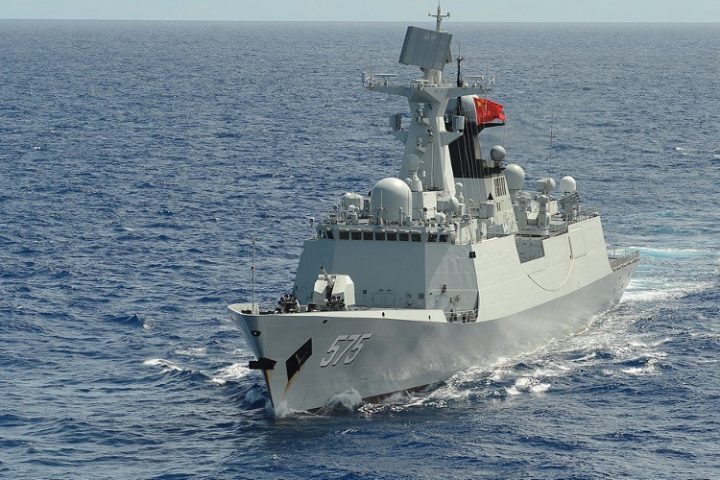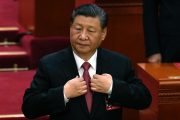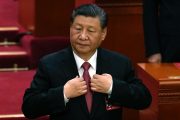
“China is a sleeping giant,” French leader Napoleon Bonaparte once reportedly said. “Let her sleep, for when she wakes she will move the world.” While we’re “woke,” China finally is wide awake and she is moving the world. And she’s now also trying to move into the Atlantic, warns a top American general.
As The Sun reports:
U.S. Gen. Stephen Townsend said Beijing is looking to establish a large navy port capable of hosting submarines or aircraft carriers on the continent’s western coast.
Gen. Townend’s [sic] comments come as experts told The Sun Online that Africa could be the theatre of a potential land war between the US and China as fears of conflict continue to simmer between two of the world’s largest military powers.
Already, China has approached countries stretching from Mauritania to south of Namibia, intent on establishing a naval facility.
If realized, that prospect would enable China to base warships in its expanding Navy in the Atlantic as well as Pacific oceans.
Gen. Townsend, who heads U.S. Africa Command, said: “They’re looking for a place where they can rearm and repair warships.[”]
“That becomes militarily useful in conflict. They’re a long way toward establishing that in Djibouti.[”]
“Now they are casting their gaze to the Atlantic coast and wanting to get such a base there.”
… China’s first overseas naval base was built years ago in Djibouti in the Horn of Africa and it is steadily increasing its capacity.
The Washington Times adds to the story, writing that Townsend’s
comments caused a stir among China watchers in Washington, some of whom said the American public should awaken to a reality the Pentagon has been quietly warning about for the past several years: Authoritarian communist government-run China is emerging as a global military power.
“It’s just a matter of time before you have regular surface and subsurface Chinese naval vessels in the Atlantic,” Bradley Bowman, who heads the Center on Military and Political Power at the Foundation for Defense of Democracies, told The Washington Times on Thursday.
“Americans need to know that’s coming and the question is what do we do between now and then to get ready,” Mr. Bowman said, adding that Gen. Townsend‘s warning should give U.S. policymakers pause as they debate defense spending priorities in the Biden era.
Thursday’s warning came roughly two weeks after the general sought to draw the attention of U.S. lawmakers to Beijing‘s expanding activities in Africa.
China‘s “activities in Africa are outpacing those of the United States and our allies as they seek resources and markets to feed economic growth in China and leverage economic tools to increase their global reach and influence,” Gen. Townsend testified before the Senate Armed Services Committee April 22.
Of course, it’s hard for the American public to “awaken” to the Chinese threat when the establishment — the Democrats in particular and the entire mainstream media — spent years demonizing Russia as our main geopolitical rival in an effort to score political points (the Trump-Russia-collusion hoax).
Russia’s economy, do note, is just one-eighth the size of China’s; this matters because military power flows from economic power.
Despite this, Joe Biden actually said on the campaign trail in Iowa last year that China is “not competition for us.” “China is going to eat our lunch?” he’d previously exclaimed. “Come on, man!”
This posture isn’t surprising, however. Given the money the Biden clan has made off Chinese interests, it’s a bit like a Manchurian family.
In reality, though, we can’t put the Chinese threat in perspective without understanding the Chinese perspective. As the Telegraph’s Kevin Myers wrote in 2003, addressing that perspective in his article “The giant who lives at 590 Yongia Road”:
Nothing in human history compares with the spellbinding phenomenon of Chinese genius, Chinese vision and a uniquely Chinese scale being simultaneously harnessed towards the one goal: the restoration of Chinese hegemony over the known world. This is the position which all Chinese leaders, from the Emperor Ch’in to Mao, have felt to be rightfully theirs.
… One would never judge modern Rome’s potential by the precedents set by the Caesars, nor use the conduct of the Aztecs as a useful guide to Peru’s intentions. But China is different, because it has repeatedly been in the forefront of human endeavour; and its multi-millennia-long continuities are deeply embedded within the consciousness of those who govern it. Moreover, the Chinese are more than nationalistic; they are a people for whom the concept of Herrenvolk is not some passing and malign idiosyncrasy, but a defining condition of identity. To their eyes we are barbarians whose historical eminence is due entirely to our infuriating mastery of the savage arts of war.
What’s more, the Western barbarians humiliated China — a nation in which “losing face” is a serious matter — during the 19th century. Consequently, Beijing now has a Great Wall-sized chip on its shoulder.
It also has something else: civilizational continuity. China is one of the oldest civilizations because while it has seen disaster, tragedy, disease, famine, war, and despotic leaders, through it all three things remained: the Chinese people, culture, and language.
In contrast, while the Roman Empire was once the world’s greatest power, it comprised disparate groups with no natural bond. Once Rome became too weak to hold them together, the empire dissolved, never to be seen again.
And as China rises, the United States is “going Roman” in the sense of becoming balkanized. So the China watchers are right: Americans need to “awaken” — to many realities. Instead, we’re just getting woke.



